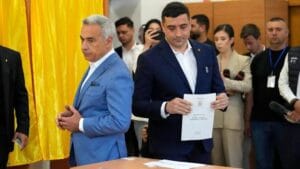Putin: NATO risks war over Ukraine’s long-range strikes
Russian President Vladimir Putin has issued a direct warning to NATO and Western countries, declaring that their support for Ukrainian long-range strikes inside Russia could pull them into direct conflict with his nation.

Russian President Vladimir Putin has issued a direct warning to NATO and Western countries, declaring that their support for Ukrainian long-range strikes inside Russia could pull them into direct conflict with his nation.
Speaking on Russian state television, Putin emphasized the gravity of the situation, stating, “This would in a significant way change the very nature of the conflict. It would mean that NATO countries, the US, European countries, are at war with Russia.”
The warning signals Putin’s growing concern about Ukraine’s access to advanced weaponry, particularly long-range systems that could target Russian military assets far beyond the frontline. As the war drags on, Ukraine has pressed Western allies to remove restrictions on such weapons, aiming to intensify the pressure on Russian forces and infrastructure.
Putin underscored that if Ukraine were allowed to deploy these long-range weapons, Moscow would respond accordingly. “We will make appropriate decisions based on the threats that will be created for us,” he said, raising the stakes in an already fraught conflict.
Russia’s ambassador to the United Nations, Vassily Nebenzia, echoed the president’s sentiments in a session of the UN Security Council, warning that Western involvement in Ukrainian strikes would amount to “direct war with Russia.” He further cautioned NATO countries about the potential consequences of engaging with a nuclear power.
Despite these sharp warnings, U.S. President Joe Biden and British Prime Minister Keir Starmer remained cautious. In a meeting in Washington, the two leaders refrained from making any formal announcements on allowing Ukraine to strike deeper into Russian territory, though they reaffirmed their support for Kyiv. “Ukraine has a right to self-defence, and we’ve stood united,” Starmer stated, hinting at the continued diplomatic deliberations on the matter.
Biden was more dismissive of Putin’s rhetoric, stating bluntly when asked about the Russian leader’s remarks: “I don’t think much about Vladimir Putin.”
Ukrainian President Volodymyr Zelenskyy, who has repeatedly called for the lifting of restrictions on long-range weapons, sees these systems as critical for targeting key Russian assets like airfields and command centers, potentially shifting the tide of the conflict. U.S. Secretary of State Antony Blinken, following meetings in Kyiv, acknowledged that Ukraine’s battlefield needs are evolving, noting, “As what Russia’s doing has changed, as the battlefield has changed, we’ve adapted.”
However, Western leaders remain cautious about approving Ukraine’s requests for U.S.-produced Army Tactical Missile Systems (ATACMS). While these missiles could strike key Russian targets, Pentagon officials argue they would not significantly counter the long-range Russian glide bombs currently wreaking havoc on Ukrainian positions.
In the meantime, NATO member Poland, which shares a border with Ukraine, remains vigilant. Polish Prime Minister Donald Tusk sought to downplay Putin’s latest warnings, suggesting they were reflective of Russia’s struggles on the battlefield. “They rather show the difficult situation the Russians have on the front,” he remarked, urging the West not to be deterred.
As the war continues, the debate over long-range strikes inside Russia is poised to be a pivotal issue in shaping future Western military support for Ukraine, and one that could bring NATO to the brink of deeper involvement.










